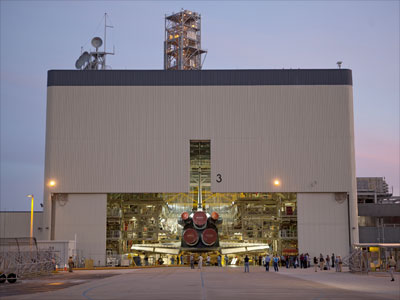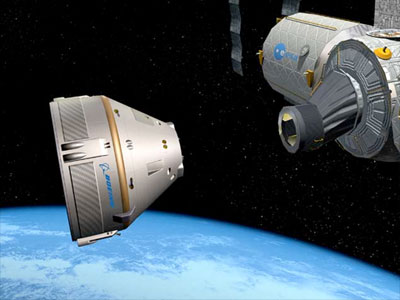 Space News space history and artifacts articles Messages space history discussion forums Sightings worldwide astronaut appearances Resources selected space history documents |
If you have previously registered, but forgotten your password, click here.
"The next era of space exploration won't wait, and so we can't wait for Congress to do its job and give our space program the funding it needs. That's why my Administration will be pressing forward, in partnership with Space Florida and the private sector, to create jobs and make sure America continues to lead the world in exploration and discovery," President Barack Obama said. Space Florida, the aerospace economic development agency of the state of Florida, is leasing the Orbiter Processing Facility-3 to the Boeing Company to manufacture and test the company's Crew Space Transportation (CST-100) spacecraft, creating up to 550 jobs along the Space Coast. The 15-year use permit deal is the latest step Kennedy is making as the center transitions from a historically government-only launch complex to a multi-user spaceport. "Neither NASA nor the Space Coast can afford to stand still. We must be aggressive in pursuing this next generation of space exploration – and the jobs and innovation that will accompany it," said NASA Administrator Charles Bolden. "Kennedy continues working to bring new commercial space activities to the center," said center director Bob Cabana. "Partnering with Space Florida to enable commercial space operations at Kennedy will help NASA maintain facilities and assets while supporting our nation's space objectives and expanding opportunities for the U.S. economy." In addition to the agreement Boeing is signing with Space Florida to reuse existing KSC facilities, the aerospace company announced it is locating it Commercial Crew Program headquarters at the center. "We are extremely pleased that Boeing will locate its commercial crew headquarters here in Florida," said Frank DiBello, president of Space Florida. "This positions our state well for future growth and a leadership role in NASA's next-generation human space exploration initiatives. It is also a key factor in ensuring Florida's space-related economy continues to thrive." The goal of NASA's Commercial Crew Program is to facilitate the development of a U.S. commercial crew transportation capability by achieving safe, reliable and cost-effective access to and from the International Space Station and future low Earth orbit destinations.  Orbiter Processing Facility 3 (OPF-3). Credit: NASA/Dimitri Gerondidakis "We selected Florida for the commercial crew headquarters because of its close proximity to not only our NASA customer at Kennedy Space Center, but also because of outstanding facilities and an experienced space workforce," said John Elbon, vice president and program manager of Boeing's Commercial Crew Programs. Boeing is developing the CST-100, a reusable capsule-shape spacecraft that will consist of a crew module and service module for transporting up to seven people, or a combination of people and cargo to space. | ||||||||
| Robert Pearlman | Boeing release Boeing to Establish Commercial Crew Program Office in Florida | |||||||
| Robert Pearlman | Florida Today provides an update on the transition of Orbiter Processing Facility-3 (OPF-3) into the renamed Commercial Crew and Cargo Processing Facility, or C3PF, to manufacture, assemble and test its CST-100 commercial crew capsules. In the Kennedy Space Center hangar that Discovery once called home, an excavator’s jaws on a recent afternoon clamped onto a third-floor catwalk, ripped a section away and dropped it into a tangled pile. | |||||||

